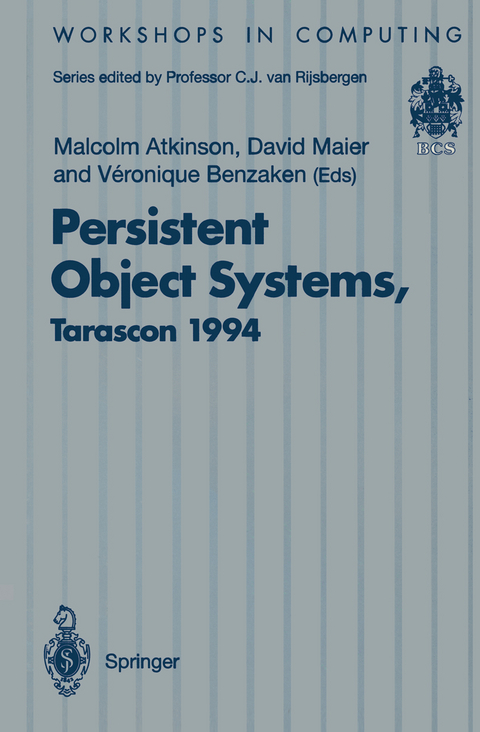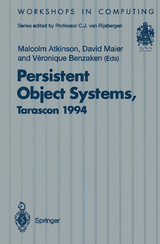Persistent Object Systems
Springer Berlin (Verlag)
978-3-540-19912-0 (ISBN)
Object Store Engineering.- Expressing Object Residency Optimizations Using Pointer Type Annotations.- Concurrent Shadow Paging in the Flask Architecture.- Object Store Engineering 2.- Buffering Long Externally-Defined Objects.- Protection in Grasshopper: A Persistent Operating System.- An Efficient Pointer Swizzling Method for Navigation Intensive Applications.- Object Caching.- Hybrid Caching for Large-Scale Object Systems.- Prefetch Support Relations in Object Bases.- Concurrency.- Semantic Synchronization in a Persistent Object Library.- Customizing Concurrency Controls Using Graph of Locking Capabilities.- Object Store Engineering 3.- Using C as a Compiler Target Language for Native Code Generation in Persistent Systems.- Garbage Collection of Persistent Objects in Distributed Shared Memory.- Applications of Persistent Object Systems 1.- Making Real Data Persistent: Initial Experiences with SMRC.- Managing Physical Folios of Objects Between Nodes.- Analysing Persistent Language Applications.- System Evolution.- Storage Class Extensibility in the Brown Object Storage System.- Correctness of Lazy Database Updates for Object Database Systems.- Changing Persistent Applications.- Reflection and New Language Constructs.- Conch: Experimenting with Enhanced Name Management for Persistent Object Systems.- Type-Safe Linguistic Run-Time Reflection - A Practical Perspective.- START: A Linguistic Reflection Tool Using Hyper-Program Technology.- DAIS: An Object-Addressed Processor Cache.- Hardware Support for Stability in a Persistent Architecture.- Optimisation.- Object Clustering in Persistent and Distributed Systems.- Query Processing in PIOS.- Application of Persistent Object Systems 2.- Type-Safe Inter-Application Communication in the Feynman Persistent Environment.- AToolkit to Support Scalable Persistent Object Base Infrastructures.- Keynote Discussion on Evolution in Persistent Systems.- Persistent Systems Engineering.- A Global Perspective of Schema Modification Management for Object-Oriented Databases.- Distributed Galileo: A Persistent Programming Language with Transactions.- Constructing a Domain-Specific DBMS Using a Persistent Object System.- Concluding Remarks.- Author Index.
| Erscheint lt. Verlag | 21.3.1995 |
|---|---|
| Reihe/Serie | Workshops in Computing |
| Zusatzinfo | XI, 546 p. 22 illus. |
| Verlagsort | London |
| Sprache | englisch |
| Maße | 155 x 235 mm |
| Gewicht | 845 g |
| Themenwelt | Mathematik / Informatik ► Informatik ► Betriebssysteme / Server |
| Mathematik / Informatik ► Informatik ► Programmiersprachen / -werkzeuge | |
| Mathematik / Informatik ► Informatik ► Software Entwicklung | |
| Informatik ► Theorie / Studium ► Compilerbau | |
| Schlagworte | Cluster • code generation • Compiler • Databases • Distributed Systems • Flask • Functions • language • operating system • Processing • programming • Programming language • Software • Software engineering |
| ISBN-10 | 3-540-19912-8 / 3540199128 |
| ISBN-13 | 978-3-540-19912-0 / 9783540199120 |
| Zustand | Neuware |
| Haben Sie eine Frage zum Produkt? |
aus dem Bereich




